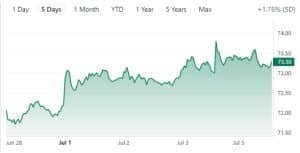Shell Nederland Raffinaderij B.V., a subsidiary of Shell, is pausing construction at its massive biofuel facility in Rotterdam. The 820,000tpa capacity site at Shell Energy and Chemicals Park will halt work temporarily to focus on other vital aspects of the company. So, what is the exact reason behind Shell’s massive decision? Will this impact its operations, global market value, and employees by large? Read and discover more…
Why did Shell take this Bold Decision?
Explaining straightway, Wael Sawan, CEO of Shell wants to prioritize the company’s most profitable ventures, particularly in oil and gas. This approach has resulted in the company pulling out of less profitable renewable and hydrogen projects. The outcome of this decision is the temporary halt of the Rotterdam biofuels project. Shell is also conducting a thorough valuation review of this unit. The 820,000t unit was also set to produce sustainable aviation fuel (SAF), apart from renewable diesel. According to media reports, they aimed to start operations in 2025, but now it has been postponed to the end of the decade.
Another key reason for ceasing the unit is to slow down activities and reduce contractor strength for better cost control. They believe this will help optimize and streamline project sequencing. With this new amendment, Shell aims to reevaluate project delivery and maintain competitiveness in the current economic scenario.
Huibert Vigevano, Shell’s downstream head confirmed that,
“Temporarily pausing on-site construction now will allow us to assess the most commercial way forward for the project. We are committed to our target of achieving net-zero emissions by 2050, with low-carbon fuels as a key part of Shell’s strategy.”
UBS analyst Joshua Stone remarked,
“The pause was consistent with Shell’s strategy to focus on returns. The delays further highlight that the advanced biofuels market is not an easy one. The oil majors have dipped their toes and found it challenging.”
Shell Canada Greenlights Major Carbon Emission Cut
As this news came as a shock to many, there is a silver lining for our news readers. Meanwhile, Shell Canada recently achieved the final investment decision (FID) for CCS projects, including the Polaris project and the Atlas Carbon Storage Hub, in partnership with ATCO EnPower. The media release notes that Polaris (100% Shell-owned) can reduce Scope 1 CO2 emissions at Shell’s Scotford refinery by capturing and storing up to 40% and by up to 22% at the chemicals complex. The operations are slated to begin by the end of 2028.
Moving on, Shell Eastern Trading has acquired Pavilion Energy from Carne Investments, gaining 100% control. This is another significant milestone that happened last month. Pavilion Energy, based in Singapore, operates a global LNG trading business with 6.5 mtpa of contracted supply, alongside shipping, and gas supply activities in Asia and Europe. This acquisition manifests Shell’s LNG portfolio. It also provides strategic access to key markets, increasing flexibility to meet energy security needs in Asia and Europe.
Even though it might seem uncanny for companies to halt projects in progress, Shell is not the first company to announce it. Energy giant BP recently announced a pause on two biofuel projects in Germany and the U.S.
Media agencies like the Financial Times have reported that Biofuel prices have been under downward pressure recently. This is because of reduced demand in Europe following Sweden’s biofuel mandate cut, alongside increased supplies from the U.S. However, Shell shares increased by 1.3% at 1106 GMT, showing a rise of over 12.5% this year.
Shell has a market cap or net worth of $235.01 billion. The enterprise value is $277.77 billion. As of the most recent data, Shell’s stock price in the last 5 days was $73.25 per share, as shown in the image below.
source: stockanalysis
NYSE: SHEL · IEX Real-Time Price · USD 73.25
How Shell Uses Carbon Credits to Shape the Future
Shell’s carbon credits play a crucial role in their goal to become a net-zero emissions energy business. These credits help Shell and its customers offset emissions, adhering to the mitigation hierarchy: avoid, reduce, and compensate. Notably, Shell selects projects certified by the Verified Carbon Standard, Gold Standard, and the American Carbon Registry. In the ESG sphere, the company helps generate carbon credits from nature-based projects and technologies. In 2023, Shell’s net carbon intensity (NCI) included 20 m carbon credits, with 4 m linked to energy product sales.
Shell’s Net-zero emissions by 2050 (Scope 1, 2, and 3), reported by Shell’s Energy Transition Strategy, 2024
Emissions from internal operations (Scope 1 and 2)
- Halve Scope 1 and 2 emissions by 2030 (2016 baseline).
- Eliminate routine flaring from Upstream operations by 2025.
- Maintain methane emissions intensity below 0.2% and achieve near-zero methane emissions by 2030.
Emissions from sold products (Scope 3):
- Reduce the net carbon intensity (NCI) of the energy products we sell by 9–12% by 2024, 9–13% by 2025, 15–20% by 2030, and 100% by 2050 (2016 baseline).
- Ambition to reduce 15-20% customer emissions from their oil products use by 2030 (Scope 3, Category 11) (2021 baseline)
Global Market Insights reports that the European biofuel market size exceeded USD 26.5 B in 2023 and is likely to register a 6.7% CAGR from 2024 to 2032, owing to the rising concerns about climate change and demand for sustainable energy sources. The European government aims to boost renewable fuels to approximately 14% of transport energy by 2030, with substantial demand. With this prediction, we can hope the future of energy giants like Shell is promising, amid the biofuel boom.


